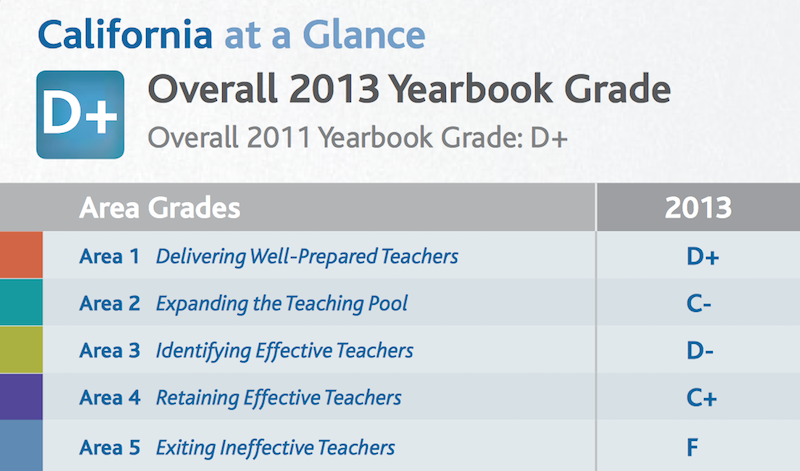Vergara v. California: Expert Testimony On CA's Report Card

In January, the NCTQ calculated a letter grade for the state of California against five areas of performance in their annual State Teacher Policy Yearbook shown above.
The overall grade for 2013 was a D+.
The prosecution called Sandi Jacobs, the Vice President and Managing Director for the NCTQ, to give testimony as an expert on national education standards. Her overall testimony centered on the NCTQ’s recommendation that the state uses a definition of teacher effectiveness based on student learning to evaluate teacher performance when considering retention, dismissal and tenure decisions.
“California law is worse for students than that of other states,” said Jacobs. “California also does not require teacher effectiveness as a part of tenure decisions.”
The NCTQ urged California’s Department of Education to restructure its system to reflect a teacher’s success by measuring how thoroughly students in that class learned the material. If students do not learn the material well enough, the NCTQ recommends that the teacher should not be considered for tenure.
Currently, however, once a teacher has been employed for two or more years, they are almost automatically considered for tenure without any measurement of effectiveness.
SEE ALSO: California's Teacher Tenure System On Trial
Similarly, teacher effectiveness is also not factored into decisions concerning layoffs. California participates in the “last in, first out” process when determining which teachers are fired and in what order. This means teachers hired most recently are the ones let go first, regardless of any consideration for how well they teach.
The defense did as much as they could to discredit the NCTQ and Jacobs as irrelevant to the case.
“You were never a teacher in a public school, were you?” asked the defense.
Jacobs replied that she had never been a teacher in California, and continued to respond ‘no’ to nearly 10 more questions asking whether she had ever been an administrator, or if she had ever participated in a tenure, dismissal or layoff decision in the state. Jacobs' experience as a teacher in New York for nine years, however, was not asked for or considered.
The judge allowed these questions but continued with Jacobs as an expert in the trial’s proceedings. The defense then questioned the NCTQ’s legitimacy as an institution capable of fairly grading a state’s education system. They based this claim on the fact that the NCTQ was not government-sponsored and its primary funders were private foundations.
To this, presiding Judge Rolf Treu asked the defense, “So government agencies are always objective?”
The defense retracted its question to Jacobs immediately.
SEE ALSO: Vergara vs. California Trial: Week 1 Break Down
The prosecution successfully chose Jacobs as an expert on one key piece of information. All State Teacher Policy Yearbooks contain responses from the state’s Department of Education. These responses detail whether the department found the information contained in the yearbook factually accurate.
“In the case of California, the state agreed with our take on all of these issues,” said Jacobs.
Outside the courtroom, Jacobs explained that the NCTQ wants an open conversation between themselves and the state. This way, any state can counter or explain a finding so that readers hear both sides.
“It’s not enough just to show up every day and try really hard,” Jacobs said. “If you’re showing up and trying really hard, but kids just aren’t learning, that’s also grounds for dismissal.”
SEE ALSO: Vergara v. California: Week 2 Breakdown
While the defense attorneys did poorly in its cross examination of Jacobs, they faired well in previous sessions. When Dan Goldhaber, a labor-economist at the University of Washington and proponent for teacher effectiveness as a means for tenure decisions took the stand, the defense caught him on a critical point.
A paper written by Goldhaber in 2002, “The Mystery of Good Teaching," references the large impact of out-of-school factors on student achievement. After more questioning, Goldhaber said that 60 percent of academic test scores could be explained by factors unrelated to the instruction a student receives.
More testimony will be heard through the end of the week, and the court will look to determine whether the five statutes outlining teacher tenure laws will remain in effect. The landmark case will inevitably decide the constitutionality of these laws in California.
Editor's Note: This article has been edited to reflect Sandi Jacobs' experience as a teacher in New York.
Reach Staff Reporter Tahsin Hyder here. Follow her on Twitter here.



